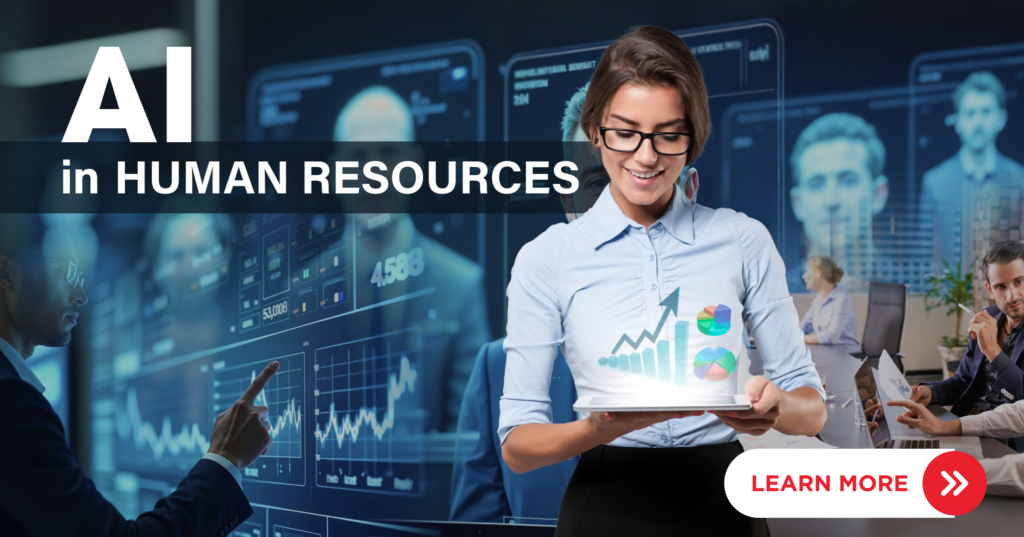Artificial intelligence or AI is, in today’s rapidly evolving digital landscape, revolutionizing various industries and HR is no exception. It is used in human resources to enhance better decision making and to streamline processes to strengthen employee engagement and development.

What is AI?
It is a simulation of the human intelligence processes by machines such as problem solving, reasoning and learning. In HR, AI creates advanced algorithms and data analytics which are key components of HR. It helps automate routine tasks, extract insights from large data compilations and facilitate more strategic decision making.
Applying AI in HR:
1. ATS or AI-powered applicant tracking systems can analyse resumes and assess candidates based on qualifications. It can even do an initial screening which saves not only on time but also helps improve the quality of the hires.
2. The AI-driven chatbots act as virtual assistants and provide personalized assistance and support to employees. This streamlines the onboarding process and enhances overall engagement.
3. AI tools help with real time performance tracking and feedback collection, along with predictive analytics. This gives managers greater insight into identifying development opportunities and to optimize team performances.
4. AI driven platforms formulate adaptive learning paths, personalize training recommendations and solutions that enhance skills and competencies.
5. HR is a sector with repetitive actions that are time consuming. AI automates these tasks reducing the man hours spent on tasks such as payroll processing. The margin for errors is also significantly reduced while efficiency increase.
Benefits of AI in HR:
● HR professionals can spend more time and focus on planning initiatives and activities beneficial to employees because AI automates the repetitive and time consuming tasks.
● AI can provide analytics with actionable insights into current trends so that HR personnel can make informed decisions and predictive planning beneficial to the workforce.
● The recruitment process is streamlined with faster response times and personalised interactions that enhance candidate experience which in turns enhances the company’s reputation.
● AI helps learning platforms create tailored content and recommendations based on individuals, performance data and learning styles.
● AI compliance tools minimize the risks of errors or biases and also ensure that regulatory requirements are adhered to while enhancing data security and privacy.
Challenges and considerations
● There is the risk that AI algorithms may follow biases present in training data which can lead to discriminatory or unfair outcomes. For now, HR professionals will have to ensure accountability, fairness and transparency regarding AI deployments.
● Privacy concerns are prevalent because AI relies on data which includes sensitive employee data. HR will have to ensure security and regulatory compliance by implementing a strong governance framework along with cybersecurity measures to safeguard data.
● Employees will have to gain the competencies and skills necessary to thrive in AI-driven environments. HR personnel should organize training and development initiatives so that the organization can manage the changes effectively and work with the new innovative work culture.
Best practices for implementation
1. AI initiatives must align with the organization’s HR priorities and goals so there is clarity and uniformity in the purpose and desired outcomes.
2. Collaboration is key to the success of an organisation and implementing AI is no exception, as HR, IT and data science should work together to ensure its success
3. To ensure the accuracy, reliability and relevance of data for AI algorithms it is important to invest in data quality assessment, cleansing and enrichment to guarantee accuracy.
4. For ethical AI usage it is important to mitigate biases and to protect employee rights and privacy through firm guidelines, policies and governance frameworks.
5. Continuous monitoring of feedback, the implementation of robust metrics and KPIs help AI models and algorithms to constantly improve.
For HR, AI provides opportunities to fine tune traditional practices, enhance innovation and create more value for both organizations and employees. Efficiency and employee engagement can be increased while tapping into new insights to navigate the modern workforce landscape effectively. AI can with an ethical, strategic and collaborative approach unlock limitless possibilities for HR as a whole to excel in the modern work environment.

 Leave Management
Leave Management HRIS
HRIS Time & Attendance
Time & Attendance










